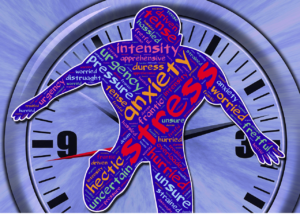In an age defined by ceaseless demands and constant connectivity, stress permeates every aspect of our lives. From work pressures to personal relationships and societal expectations, the list goes on. Yet within this chaos lies an opportunity for transformation. Stress management isn’t about avoidance but rather cultivating resilience. Through mindfulness, exercise, sleep, and nurturing connections, we regain balance and can learn the practice of stress management techniques. Embracing a proactive mindset and self-care, we unlock vitality, transcending stress to thrive in a future shaped not by challenges but by our resilience and growth.
Common Signs Of Stress

Depression anxiety and its effects extend far beyond bodily ailments, disrupting sleep, cognition, and behavior. The journey toward burnout leaves us adrift in overwhelming emotions, yet amidst the storm lies the potential for renewal. Through resilience and self-care, we reclaim agency, forging a path toward restoration amidst chaos. Here is a list of the common signs of stress.
Muscle Tension And Fatigue
Stress commonly triggers muscle tightness in the neck, shoulders, and back, along with persistent fatigue despite ample rest. The body is always in a state of tension and unable to rest adequately.
Changes In Sleep Pattern
Sleep disturbances are common when under stress, with some people oversleeping or experiencing daytime sleepiness due to emotional exhaustion. The body releases Cortisol hormones when under stress. It has a powerful influence on waking up and sleeping in the human body.
Irritability And Anxiety
Stress amplifies irritability and mood swings, fostering frustration and anger in daily interactions. Additionally, persistent worry and feelings of impending doom are common emotional responses to stress, shaping individuals’ perceptions uniquely.
Overeating And Undereating
Stress alters appetite regulation, leading to diverse eating habits. Some overeat as a coping mechanism, while others eat less than usual, reflecting the varied impact of stress on dietary patterns.
Forgetfulness
Stress disrupts cognitive function, impairing concentration and memory retention, impacting work or academic performance. Thus fueling feelings of frustration and inadequacy, highlighting its profound effect on daily task navigation.
Isolation
Feeling overwhelmed by stressors may lead individuals to withdraw socially, seeking solace in solitude as a coping mechanism. This withdrawal highlights how stress reshapes social dynamics, favoring emotional self-preservation over external engagement.
Effective Stress Management Techniques

Here is a comprehensive list offering a fulfilling overview of effective stress management techniques:
Practice Deep Breaths
Stress often overwhelms us in life’s chaos. Yet, the remedy is simple – our breath. Deep breathing soothes our nervous system, easing tension and allowing us to reclaim control. Find a quiet space, sit comfortably, and close your eyes. Inhale deeply for four counts, hold for four, and exhale slowly. Repeat until calmness reigns, restoring serenity amid life’s demands.
Mindful Meditation
Amid the chaos, mindfulness meditation offers solace. Hence, it is one of the most important stress management techniques out of many. Find quiet, sit comfortably, and close your eyes. Take deep breaths, focusing on inhales and exhales. Acknowledge thoughts without judgment and return to breathing gently. Expand awareness to include sounds and sensations. Embrace the present. Guide the wandering mind back gently. Tranquility lies in this practice amidst life’s whirlwind. This is a very good stress management technique.
Regular Exercise
In life’s rush, prioritize exercise for adequate stress relief. Exercising releases endorphins, regulating cortisol levels. Practicing it on a regular basis improves sleep, aiding stress recovery. Achieving fitness goals boosts confidence. Whether walking, yoga, or dancing, exercise provides a mental break for a refreshed mindset.
Inculcate Healthy Living Habits
Amid the chaos, diet’s stress impact is often overlooked. Nourish with whole foods—fruits, veggies, lean proteins, whole grains. Limit sugar and caffeine to curb stress! Balanced meals help maintain stable blood sugar. Savor meals mindfully to reduce stress eating.
Get Quality Sleep
Restful sleep is crucial for combating stress in today’s fast-paced world. During sleep, your body repairs and rejuvenates, aiding recovery from daily stressors. Quality sleep enhances emotional resilience, enabling better stress management with a clear mind. Adequate rest ensures you wake up refreshed and ready to face the day with renewed energy.
Time Management Is Important
Balancing work, responsibilities, and personal life is akin to juggling, yet effective time management is a potent stress reducer. Prioritize crucial tasks with planners, maintain realistic expectations, minimize distractions, and learn to decline and delegate tasks to avert overwhelm and achieve a harmonious life balance.
Practice Positive Self-Talk
Pay attention to your inner voice; negative thoughts can heighten stress. Challenge them by questioning their basis and replacing them with constructive perspectives. Create uplifting affirmations to bolster self-image. Practice self-compassion, treating yourself as kindly as you would do to a friend. Focus on solutions rather than dwelling on problems; embrace setbacks as learning opportunities to build resilience.
In conclusion, navigating the complexities of stress in our lives requires a multifaceted approach that addresses physical, emotional, and social dimensions. It is crucial to discover effective stress management techniques and work effectively on them. Some of the few are listed already! By recognizing the interconnectedness of these elements and taking proactive steps to manage stress, we can navigate life’s challenges with greater ease and foster a sense of balance and well-being amidst the chaos of modern living.



